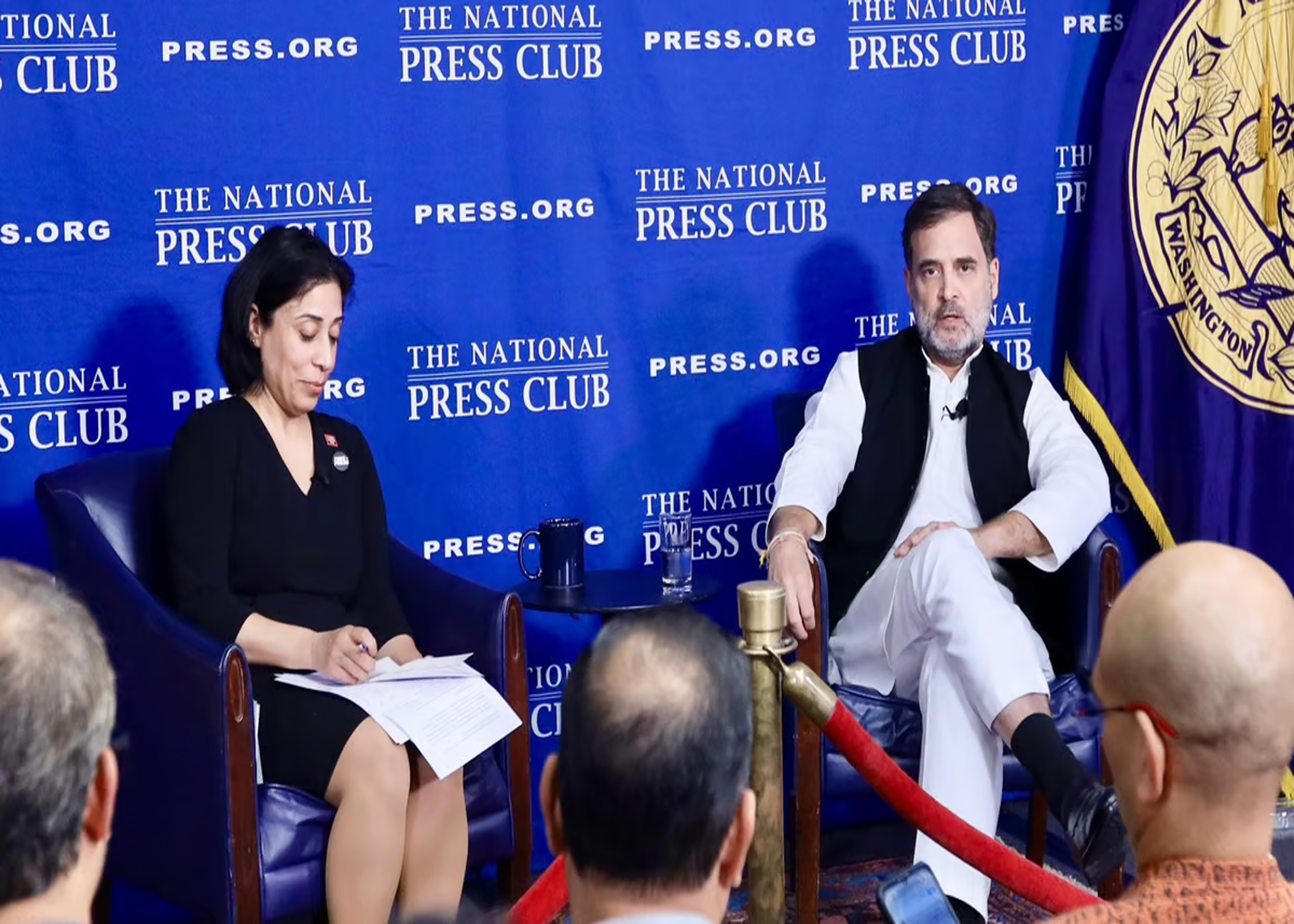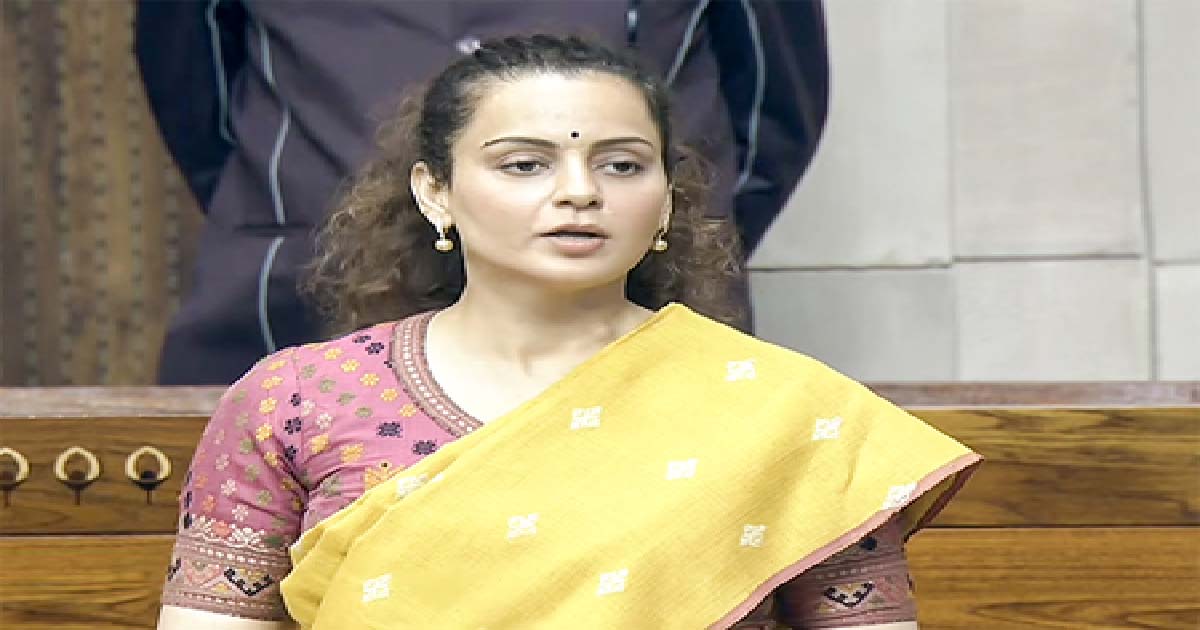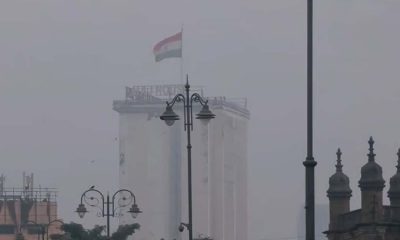International News
‘Don’t Think PM Modi Has Handled China Well…’: Rahul Gandhi Attacks BJP Over Border Standoff

Washington DC [US], September 11/ Leader of the Opposition in the Lok Sabha, Rahul Gandhi came out heavily against the Bharatiya Janata Party-led Centre over the border standoff with China and said that Prime Minister Narendra Modi has not handled the situation well.
The Congress leader was speaking at an interaction with media at the National Press Club in Washington DC on Tuesday (local time).
“We’ve got Chinese troops occupying land the size of Delhi in Ladakh, and I think that’s a disaster. The media doesn’t like to write about it. How would America react if a neighbour occupied 4,000 square kilometers of its territory? Would any president be able to get away with saying he’s handled that well? So, I don’t think Mr Modi has handled China well at all. I see no reason why Chinese troops should be sitting in our territory,” Rahul Gandhi said.
Notably, in 2020, the Indian and Chinese troops clashed at Galwan, the same year the pandemic started.
Since May 2020, when the Chinese troops tried to aggressively change the status quo on LAC in eastern Ladakh, both sides have been deployed in forward positions near Patrolling Point 15, which emerged as a friction point in the wake of the Galwan clash.
Over 50,000 Indian soldiers have been stationed since 2020 at forward posts along the LAC, with advanced weapons to prevent any attempts to change the status quo unilaterally on the LAC.
Terming the Chinese vision of production as “non-democratic”, the Raebareli MP stressed on the idea of US and India placing a production vision in a democratic and free society.
“We don’t want to do it like the Chinese are doing it. We don’t want to do it in an environment which is non-democratic, which is not liberal. So the real question for the 21st century, the Chinese have placed a production vision on the table. It’s a non-democratic production vision. Can the United States and India answer that by placing a vision for production in a democratic free society? And I think that’s where a lot of answers lie,” he said.
Rahul, also opened on his new role and responsibilities as the Leader of Opposition, and said there is an ideological war taking place between the INDIA bloc and the BJP-RSS. He further vowed that the Opposition wants to ‘defend’ India’s institutions and provide a broader vision for the country.
“It’s an extension of what I did earlier. There’s an ideological war taking place in India between the Congress and our partners and the BJP and the RSS. They are two completely different visions of India. We believe in a plural vision, a vision where everybody has a right to thrive… an India where you’re not persecuted because of what religion you believe in or what community you come from or which language you speak, versus a much harsher, centralizing vision. So that’s the landscape. And then we fight on that landscape,” the Congress leader further said.
“[We want to] defend India’s institutions, defend the weaker sections in India, defend the lower caste, tribals, minorities, poor people. After the yatra, I try to become the voice of as many people as I can. So for that…you have to go deeper, deep into the agricultural world, the conflicts that are taking place there, into the financial system, into the tax system. So you have to, in a sense, go deep into it, talk to people and then get, understand deeply what they’re saying and then transmit it and at a broader level, provide a vision, INDIA alliance vision for the country, which is obviously going to be fundamentally different than the centralizing, monopolized vision that the BJP is presenting,” he added.
The Congress leader further said that at one time the West used to be the producer of the world, but slowly China took over the responsibility.
He said that not manufacturing enough means, not enough employment can be generated. Rahul further added that there is a huge opportunity for both India and the US to regain the ability to produce.
I am more interested in the act of production: Rahul
“Here in the United States that the West, America, Europe, and India, the West used to be the producer of the world. If you wanted to buy a car, in the 60s, you bought an American car, washing machine, refrigerator…You guys were at the forefront of that. And then somewhere along the line, America decided, India decided, and the West decided that we’re just going to stop. And we handed the whole thing to the Chinese. Now for a country like India, to simply say that we’re going to ignore manufacturing, and only run a services-based economy, it means you cannot give employment to people,” Rahul Gandhi “I am more interested in the act of production- also called manufacturing. Look at what most American, Indian and European countries do. They organize consumption. Uber organizes consumption. Organizing consumption is easy. Organizing production is a completely different ballgame, much more complicated. You have to deal with things when you organize production that you simply don’t have to deal with when you organize production. So to me, there’s a huge opportunity for India and the United States to regain that ability to produce,” he further added.
Speaking on the unemployment situation, the LoP in Lok Sabha said he wants to support small and medium-small businesses and promote a decentralised production system.
“We have a government in Karnataka and Telangana. Each area in India has its own specialty of production. If you go to pretty much any district, Ballari in Karnataka has a very deep textile industry which has been destroyed. So we are looking at these pockets of excellence and then trying to bring modern technology, financial support to build them. So the vision would be more of a decentralized production system. Unlike China, which is huge factories, we would be thinking about smaller and small medium businesses and embedding modern technology into that. We’re testing some of these ideas in Karnataka and Telangana,” he said.
Rahul Gandhi is on a three-day visit to the United States. During this, he has interacted with Indian diaspora besides students and faculty at universities and also met US lawmakers.
This is Rahul Gandhi first visit to the US after he became Leader of Opposition in the Lok Sabha.
Business
India-Russia friendship steady like pole star amid global uncertainty: PM Modi

New Delhi, Dec 5: Hailing India-Russia ties, Prime Minister Narendra Modi on Friday said that the friendship between the two countries has remained like a pole star amidst the ups and downs faced by the world in the past 80 years.
While making a joint press statement with Russian President Vladimir Putin following their talks at the Hyderabad House in New Delhi on Friday, PM Modi said that the ties between two nations have stood the test of time and thanked Putin for his friendship and unwavering commitment to India while recalling the efforts made by the Russian leadership to elevate bilateral ties.
“Today, I am delighted to welcome President Putin to the 23rd India-Russia Summit today. His visit comes at a time when our bilateral relations are experiencing several historic milestones. 25 years back, President Putin laid the foundation for our strategic partnership. 15 years ago, in 2010, our partnership was granted the status of a Special Privileged Strategic Partnership. For the past two and a half decades, he (President Putin) has nurtured this relationship with his leadership and vision.
“His (President Putin) leadership, under all circumstances, has elevated our ties to new heights. I express my heartfelt gratitude to President Putin, my friend, for this deep friendship and unwavering commitment to India. The world has seen many ups and downs over the past eight decades. Humanity has faced many challenges and crises and amidst all this, the India-Russia friendship has remained like a pole star. This relationship, founded on mutual respect and deep trust, has always stood the test of time,” he added.
Recalling recent heinous terror attacks in both countries, PM Modi said that India and Russia have stood together in the fight against terrorism.
“Today we also discussed regional and global issues. India and Russia have long cooperated shoulder to shoulder in the fight against terrorism. Whether it’s the terrorist attack in Pahalgam or the cowardly attack on Crocus City Hall — the root of all these incidents is the same. India firmly believes that terrorism is a direct attack on the values of humanity and global unity against it (terrorism) is our greatest strength.”
PM Modi announced that India and Russia will cooperate to train Indian seafarers in polar waters. “We will now cooperate to train Indian seafarers in polar waters. This will not only strengthen our cooperation in the Arctic, but will also create new employment opportunities for India’s youth.”
Reiterating India’s stance on Ukraine conflict, he said, “India has advocated for peace in Ukraine from the very beginning. We welcome all efforts to find a peaceful and lasting solution to this issue. India has always been ready to contribute and will continue to do so.”
PM Modi also termed energy security as a strong and important pillar of India-Russia partnership. He stated that cooperation between India and Russia in civil nuclear energy has been crucial in realising shared clean energy priorities.
“Energy security has been a strong and important pillar of the India-Russia partnership. Our decades-old cooperation in civil nuclear energy has been crucial in realising our shared clean energy priorities. We will continue this win-win cooperation. Our cooperation in critical minerals is crucial to ensuring secure and diversified supply chains across the world,” stated PM Modi.
Earlier, taking the India-Russia Special and Privileged Partnership ahead, PM Modi warmly welcomed President Putin at the Hyderabad House to participate in the 23rd India-Russia Annual Summit.
With both countries sharing a longstanding and time-tested bond, the two leaders are holding comprehensive and detailed discussions aimed at further strengthening the bilateral relations.
International News
‘Govt follows protocol’: BJP respond after Rahul Gandhi remarks on Oppn-Putin meeting

New Delhi, Dec 4: After Congress MP Rahul Gandhi alleged that the Centre has been advising foreign delegations against meeting or interacting with the Leader of the Opposition (LoP) – a practice he said was followed during previous UPA and NDA regimes, ruling party leaders on Thursday rejected the claim, asserting that the “government follows due protocol” in all matters.
The startling charge by Rahul Gandhi, while speaking to reporters outside Parliament, comes hours ahead of Russian President Vladimir Putin’s two-day visit to India. His remarks are set to raise eyebrows in the political corridors and also set the stage for heated sparring between the BJP and Congress.
Rahul Gandhi said, “Meetings with the LOP take place with delegations coming from outside. It has been a long-held tradition and has always been done this way,” he said, while citing instances during Manmohan Singh and Atal Bihari Vajpayee governments.”
Speaking to Media, BJP MP Kangana Ranaut said, “These decisions are made by the government. Atal ji was a national asset, and the entire country was proud of him. He was a great patriot. I don’t know why Rahul Gandhi is not being allowed, but in my opinion, his commitment to the nation is questionable. His role in creating unrest and trying to divide the country raises doubts about his intentions. And if Rahul Gandhi is comparing himself to Atal ji, then I would suggest he join the BJP — only then could he become like him.”
BJP MP Bhim Singh said, “Why would the government stop him? He only creates chaos and does not speak where he is supposed to speak.”
Echoing a similar stance, BJP MP Brij Lal added, “The government follows protocol, and work will be carried out accordingly. Rahul Gandhi is only making this political.”
JD(U) leader K. C. Tyagi clarified, “The government does not decide such protocols. Visiting heads of state themselves decide whom they wish to meet.”
Union Minister Ramdas Athawale added, “Foreign leaders visit on the invitation of the ruling party or government. If President Putin wishes, Rahul Gandhi, as LoP, can meet him. The government has no role in that.”
International News
Trump says Putin ‘would like to end war’ with Ukraine

Washington, Dec 4: US President Donald Trump said Russian President Vladimir Putin “would like to end the war” in Ukraine, citing what he described as a “very good meeting” between Putin and two close Trump allies, Jared Kushner and Steve Witkoff, in Moscow.
Trump told reporters at the White House on Wednesday (local time) that he had spoken with Kushner and Witkoff following their talks with Putin. “Their impression was that he would like to see the war ended,” Trump said. “I think he’d like to get back to a more normal life. I think he’d like to be trading with the United States of America, frankly, instead of losing thousands of soldiers a week.”
Trump added, “I thought they had a very good meeting yesterday with President Putin. We’ll see what happens. It’s a war that should never have been started. It’s a war if I were president… that war would have never happened.”
He also reiterated his longstanding claim that the conflict would not have erupted if he had been in office. “If I were president, no war would have ever happened. They would have had 100 per cent of their territory. Nothing would have happened,” he said.
Trump described the battlefield toll as catastrophic. “Think of this — last month, 27,000 soldiers… mostly young soldiers died last month; in one month,” he said. “That’s the only reason I’m trying to help.”
He also said the US was no longer directly financing Ukraine’s war effort, telling reporters, “We’re not spending any money in the war, we’re selling to NATO. We’re not being ripped off like we were under Biden.”
Asked about Kremlin statements suggesting no compromise was forthcoming, Trump replied, “I don’t know what the Kremlin is doing.”
The Trump team’s back-channel contacts with Moscow have drawn global attention amid stalled frontline dynamics and ongoing diplomatic efforts. Casualty figures in the conflict remain contested, while the United States and European allies continue to debate next-phase military and political frameworks for ending the war.
President Putin arrives in New Delhi on Thursday for a summit talk with Prime Minister Narendra Modi.
-

 Crime3 years ago
Crime3 years agoClass 10 student jumps to death in Jaipur
-

 Maharashtra1 year ago
Maharashtra1 year agoMumbai Local Train Update: Central Railway’s New Timetable Comes Into Effect; Check Full List Of Revised Timings & Stations
-

 Maharashtra1 year ago
Maharashtra1 year agoMumbai To Go Toll-Free Tonight! Maharashtra Govt Announces Complete Toll Waiver For Light Motor Vehicles At All 5 Entry Points Of City
-

 Maharashtra1 year ago
Maharashtra1 year agoFalse photo of Imtiaz Jaleel’s rally, exposing the fooling conspiracy
-

 National News1 year ago
National News1 year agoMinistry of Railways rolls out Special Drive 4.0 with focus on digitisation, cleanliness, inclusiveness and grievance redressal
-

 Maharashtra1 year ago
Maharashtra1 year agoMaharashtra Elections 2024: Mumbai Metro & BEST Services Extended Till Midnight On Voting Day
-

 National News1 year ago
National News1 year agoJ&K: 4 Jawans Killed, 28 Injured After Bus Carrying BSF Personnel For Poll Duty Falls Into Gorge In Budgam; Terrifying Visuals Surface
-

 Crime1 year ago
Crime1 year agoBaba Siddique Murder: Mumbai Police Unable To Get Lawrence Bishnoi Custody Due To Home Ministry Order, Says Report





















